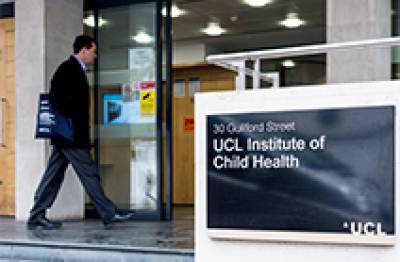Muscular dystrophy studies funded to test new treatments
29 August 2024
Five research projects at UCL are benefiting from over £800,000 in total funding announced by Muscular Dystrophy UK, to improve diagnosis, monitor progression and test potential new treatments for muscle wasting and weakening conditions..

The charity helping the more than 110,000 children and adults in the UK living with one of over 60 muscle wasting and weakening conditions is funding the research projects that will explore several different conditions including limb-girdle muscular dystrophies, laminopathies, and Duchenne muscular dystrophy.
Muscular Dystrophy UK announced the funding as part of their 2024 grant round, with £1.7 million for the UCL projects and seven other studies.
Grant recipient Professor Patrizia Ferretti (UCL Great Ormond Street Institute of Child Health) and her team will look at brain cells from people with Duchenne muscular dystrophy, a progressive muscle wasting condition, in order to improve understanding of how brain function is affected in people with the condition.
She said: “Development of specific mechanism-based therapies for people living with Duchenne muscular dystrophy targeting emotional, cognitive, and behavioural problems could really make a big difference, by reducing anxiety and hyperactivity, and improving working memory. This could be beneficial by helping them settle in a school or work environment and in general social interactions.
“Overall, this would help to improve the quality of life, which would have positive outcomes for the individuals and their parents or carers supporting them.”
Dr James Sleigh (UCL Queen Square Institute of Neurology) and colleagues will use a mouse model of SORD neuropathy, a condition that affects nerves outside of the brain and spinal cord called peripheral nerves, to test potential gene therapies.
He said: “Our work will explore new models of genetic peripheral neuropathy, which is essential to help us better understand why motor and sensory nerves are selectively impacted by CMT/SORD neuropathy.
“The new model for SORD neuropathy will provide a key tool for testing therapeutic strategies that will hopefully one day help people living with the condition. This project will allow us to identify, track and correlate clinical variables in SORD neuropathy patients, which is a key step towards being able to evaluate condition progression and treatment success in the clinic.”
A project led by Professor Henry Houlden (UCL Queen Square Institute of Neurology) will use state-of-the-art genetic sequencing techniques to find genes that cause limb-girdle muscular dystrophies.
Dr Roope Mannikko’s (UCL Queen Square Institute of Neurology) project aims to develop a new gene therapy for periodic paralysis.
A project led by Professor Francesco Saverio Tedesco (UCL Cell & Developmental Biology and the Francis Crick Institute) which will explore the link between the shape of nuclei and DNA organisation in muscle cells from people living with laminopathy.
Dr Kate Adcock, Director of Research and Innovation at Muscular Dystrophy UK said: “Every year at Muscular Dystrophy UK, we look to fund the highest quality research that will not only bring research forward but also improve the lives of people living with muscle wasting and weakening conditions.
“We are always delighted to fund research into a variety of conditions including the five projects at University College London. We’ve seen an increasing number of conditions in our research portfolio including funding research into periodic paralysis and CMT/SORD neuropathy for the first time.”
Links
- Professor Ferretti’s project
- Dr Sleigh’s project
- Professor Houlden’s project
- Dr Mannikko’s project
- Professor Saverio Tedesco’s project
- UCL Great Ormond Street Institute of Child Health
- UCL Queen Square Institute of Neurology
- UCL Cell & Developmental Biology
Image
- Reserach laboratory at UCL
Source
Media contact
Chris Lane
tel: +44 20 7679 9222 / +44 (0) 7717 728648
E: chris.lane [at] ucl.ac.uk
 Close
Close


